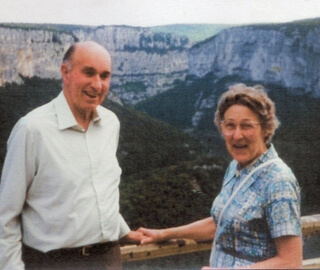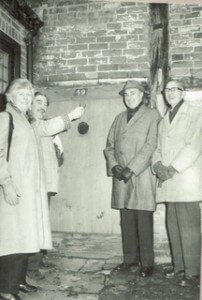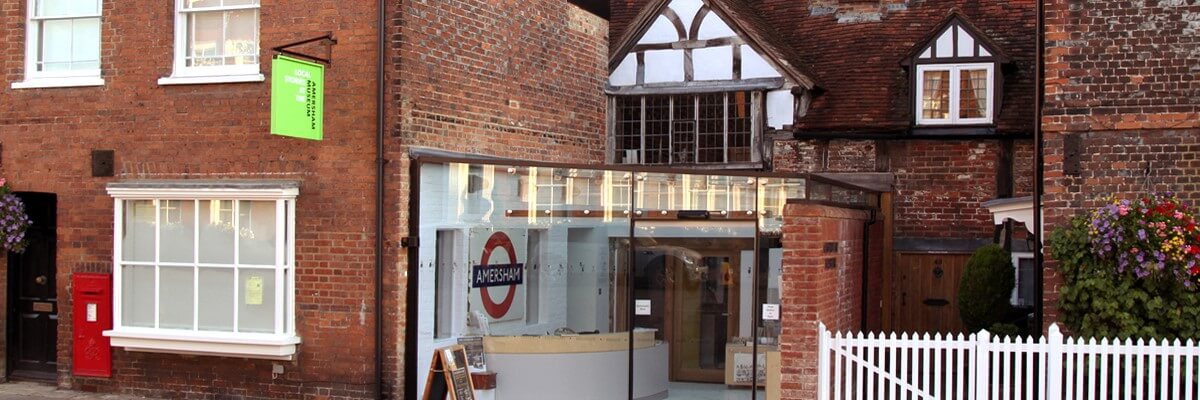800This article was written in 2007 for the Amersham Society/Amersham Museum newsletter by Jane Mayhew, Philip’s daughter, and is reproduced here with her permission.

Philip Plumbly was born 90 years ago, the fourth child and the only son of Philip Charles Plumbly, who was a well-to-do Norfolk farmer, and his wife, Constance Edith. Both his parents came from local farming families and there were a great many relations living in the same area. From the time he was a very small child the family lived at Felmingham Hall, which is a large and rather fascinating house. He was absorbed in the life of the farm and the household – a rural way of life of a long time ago now. Farms were considerable local employers and working the land involved skills with horses. This was a mixed farm, whose husbandry was primarily geared to producing the bullocks that were his father’s main interest. In the household was his mother, their longstanding maid, Lucy, who had been much involved in the upbringing of all four children, and a shifting population of younger maids. This was a life he looked back on as a kind of lost Eden.
Because, in 1929 when he was 12, this world was shattered. His father died in tragic circumstances and the family was ruined in the economic depression of the time; for Philip, this was a defining event of life. At his father’s funeral in the church in Felmingham they sang “Lead kindly light, amid the encircling gloom. Lead thou me on. The night is dark and I am far from home.” reflecting the family’s mood of that time perfectly. He and his mother lived on the charity of his father’s relatives for a few years until his schooling in the nearby town of North Walsham was complete. They lived in much reduced circumstances, without maids, and his mother had suddenly to take on all the full range of domestic tasks of the time, while he drew all the water they needed bucket by bucket from the well and grew vegetables for the two of them. They also kept poultry on a small commercial scale, building up to some 200 laying hens. Although their standard of life was rather better than in the local cottages, the come-down and the humiliations and his mother’s mourning must have subdued and burdened their life in those years. Then, after he left school, from the day he began earning until the day his mother died 25 years later, he made himself responsible for housing and supporting her. It made him a very serious young man, with little space for frivolity.
He arranged a move from Norfolk to Twickenham, where two of three considerably older sisters could join the household. Rural life was left behind and so were the myriad relatives of the Norfolk days. The compensations were piped water and electricity. He applied himself to evening study, because competitive exams were then the route into the various grades of the Civil Service. After a while working as a sales assistant in Gamages, he entered the Civil Service as a “boy clerk” at the age of 17. He was in the air ministry to begin with but, by the time war broke out, he had begun on his career in the Inland Revenue.
He joined the TA in 1939 and served in London anti-aircraft defences. In 1941 he was sent to Egypt where he was commissioned as an officer in the Royal Army Service Corps. He remembered the four months training in Cairo as a time of self-discovery and an expansion of mind with other trainees. After gaining his commission his concerns were with petrol supplies – in Lebanon, Syria and Palestine. Then he commanded a unit in occupied Italy, and finally was involved in re-establishing the Department of Customs in Singapore after the Japanese occupation. His war service was an exceptional part of life – no less for him than for everyone else. These years no doubt contained memories he did not want to revisit, but they were also the most colourful and adventurous time of his life, resonating through the years to come.
In 1946 he resumed his career in the Inland Revenue and rose over the years to be an Inspector in charge of many different tax districts. The rule used to be that you were told where you had to go with a fortnight’s notice. Families and house-moving had to follow as best they could, and by the early 1950s he had acquired a family. In 1949 he married Katharine Bays, the youngest daughter of a Peterborough wine merchant. Although they met through mutual friends over a game of tennis, his family have never heard of him playing tennis either before or since. Together they followed his postings to Boston, Leicester and Nuneaton over the following years. There followed some 20 years when his postings were all in and around London and their children, Jane and Andrew grew up in Ickenham, where Philip was variously sidesman, treasurer and church warden at the local church of St Giles and a founder member and first treasurer of an Abbeyfield Society.
The family had got to know Amersham when driving to Bicester to visit two of his sisters and when Philip retired in 1977, he and Kay moved to Old Amersham. This was a happy settled time and they made a great many friends; they were involved in the life of the church in Coleshill for almost thirty years. Philip was a long-term treasurer of the Amersham Society, the Amersham Citizens Advice Bureau, and the Amersham branch of the National Trust.
In the end Kay’s health began to fail and Alzheimers took its awful toll. Philip cared for her at home as long as he could before installing her in a nursing home nearby until her death in 2004. A little over a year ago he decided to leave Amersham and move to sheltered accommodation in Wilton, near Salisbury, close to his daughter and her husband. This move was driven by increasing difficulties with mobility. He made a strong start, going out for a slow walk every day to the local shops, and in May, 2007 he celebrated his 90th birthday with his family and friends – quite a landmark. His period of failing health after that was mercifully short.
Throughout his life he enjoyed reading and gardening; the gardening followed from his vegetable-growing in real earnest while living with his mother and finishing his schooling. He had many favourite novels – lots of Trollope and Dickens, favourite biographies and histories, Macaulay’s essays, and some favourite poetry anthologies. These were the books he had with him in a tottering pile on his bed-table in Salisbury Hospital. In recent days, his daughter says that a great many people have said and written nice things about him. The most frequent comments have been – many of them from people in Wilton who obviously had only a short acquaintance with him and sometimes under difficult circumstances – to say simply: “Your father was a real gentleman” – to which his many friends in Amersham would concur.
 Philip Plumbly was for many years involved in the creation of Amersham Museum. The photo to the left was taken just after 49 High Street was acquired to house the town’s Museum. It shows, from left to right: Monica Mullins (Curator), Eric Corns (Chairman), Philip Plumbly (Treasurer) and Frank Peers (Secretary) all from the Amersham Society.
Philip Plumbly was for many years involved in the creation of Amersham Museum. The photo to the left was taken just after 49 High Street was acquired to house the town’s Museum. It shows, from left to right: Monica Mullins (Curator), Eric Corns (Chairman), Philip Plumbly (Treasurer) and Frank Peers (Secretary) all from the Amersham Society.

